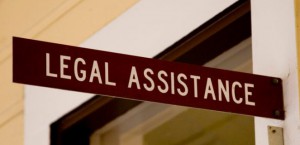Should Americans Have a Right to A Lawyer in Civil Court?
In 1963, the Supreme Court decided Gideon v. Wainwright, ruling unanimously that the Constitution required all criminal defendants to have a right to representation in court. One of the main rationales Justice Black’s opinion in Gideon was that the “noble ideal” of “fair trials before impartial tribunals in which every defendant stands equal before the law . . . cannot be realized if the poor man charged with crime has to face his accusers without a lawyer to assist him.”
In criminal cases, a person’s liberty may be at stake. However, civil cases can also inflict great personal loss. Some civil cases involve large sums of money, others may involve housing, public benefits, child custody, or employment. Many advocate providing legal counsel as a right in cases where basic rights like family or shelter are at risk. Often, these decisions are the key to helping indigent clients move forward in their lives.
Legal Aid: Solution or Stopgap?
Currently, the poor have some access to legal assistance in civil cases through Legal Aid. Legal aid programs assist in three main types of cases: accessing basic necessities (like housing, healthcare and government benefits); ensuring safety and stability (like domestic violence, guardianship, and student discipline); and economic security (like employment, taxes, and consumer protection). These programs exist all over the country, and are very helpful to many. However, Legal Aid offices are not mandated to take all cases, and due to lack of resources must choose carefully whether to represent clients. 
However, a right to an attorney in certain cases would guarantee that clients could not be turned away. Even if this were to exist, a separate system of Legal Aid would be an important community resource. This is because Legal Aid often helps clients who are plaintiffs or who are applying for certain programs or benefits; some of what they provide would not overlap with a civil Gideon. A civil right to representation in certain cases could potentially create new legal jobs and would ideally free up legal aid attorneys to do more good work.
Would the Failings of the Public Defender System Be Repeated?
While there is a guaranteed right to representation in criminal cases, there are also many flaws in the public defender system. Especially in some counties, public defense attorneys are overloaded with too many clients and sometimes do not have the time and energy that a private criminal lawyer could bring to an individual case. On the other hand, these attorneys are often incredibly well-versed in criminal law and some of the most experienced trial lawyers. Dedicated public defenders can often be great assets to their clients.
One concern is that the lack of staffing and resources faced currently by criminal public defenders would just be mirrored in a civil defense system. This is a rather cynical argument, as though our society could not possibly provide better funding to both a criminal and civil public defense system. The limitations that public defenders face are due to a lack of economic commitment to the principles of just representation. In a fair legal system, public defense would be sufficiently funded; we should try to move forward by making this a reality rather than naysaying.
The Way Forward
President Obama is a major proponent of increasing civil representation. In September, his administration released a memorandum that established the White House Legal Aid Interagency Roundtable to “increase the availability of meaningful access to justice for individuals and families and thereby improve the outcomes of an array of Federal programs.” This statement reflects another important point about the benefits of civil representation—local and federal governments can set up meaningful programs or pass important legislation in hopes of protecting vulnerable individuals. However, in a system where few people are adequately represented, those programs and laws won’t work as intended.
At the same time, there has long been a national movement within the legal community to find a way to provide an attorney for those facing certain civil issues. Lawyers and judges are uncomfortable with indigent and vulnerable clients trying to represent themselves in complicated matters. In several states and jurisdictions, pilot programs have begun to try to work out what it would take to provide these services.
As Martin Luther King famously said, “injustice anywhere is a threat to justice everywhere.” A commitment to civil legal representation for all would be a step forward in defeating injustice.

Comments